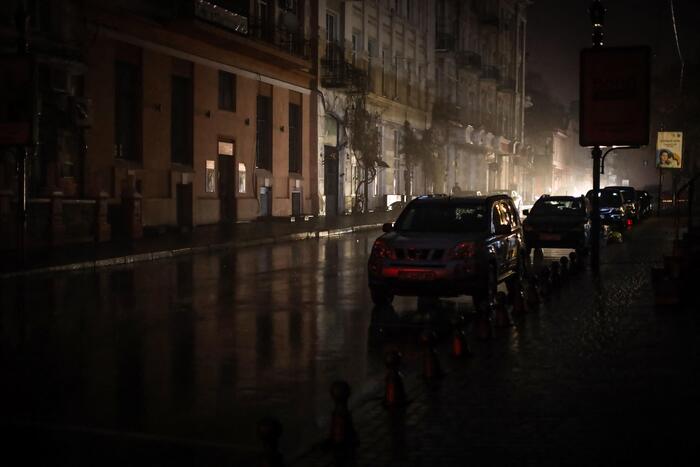Repairing the electrical system damaged by the drones launched by the Russian army last night over Odessa and the region could take up to two or three months:
"If you have the opportunity to temporarily leave the city and areas without power, then it's worth doing": this is the message to the residents launched by the Department of energy systems of the Odessa region after the communication of the state electric operator Dtek which warned of the long times for the restoration of the electricity.
This was reported by the Ukrainian media. "Odessa and almost the entire region remain without electricity," Dtek said in a statement.
The situation in the Odessa region is very difficult
.
After the Russian attack with Iranian drones, the city and other places in the district are in darkness: more than 1.5 million people in the region are without electricity.
Only critical infrastructure is connected, as far as electricity can be supplied,” Ukrainian President Volodymyr Zelensky said in his evening video message commenting on the situation in Odessa after last night's kamikaze drone attack.
The situation in the Kherson region remains difficult with Russian shelling yesterday in several settlements near the contact line.
This was reported by the General Staff of the Ukrainian armed forces, quoted by Ukrainska Pravda.
According to the authorities, the Russians also opened fire on Berislav's hospital and the building was badly damaged.
According to regional state administrations, yesterday the Russians shelled the territory of 9 Ukrainian regions, several residents were injured, and houses and other structures were destroyed.
In addition to Kherson, the affected territories are Sumy, Zaporizhzhia, Dnepropetrovsk, Kharkiv, Lugansk, Donetsk, Mykolaiv and Odessa.
The Holy See may have an important role
in the mediation between Ukraine and Russia but "this moment has not arrived".
There are therefore no conditions, in a Ukraine still under bombs, to open a peace table and in any case anyone who wants to help this process, including the Vatican, "cannot be neutral", cannot put the two states on the same floor.
The Ukrainian Foreign Minister Dmytro Kuleba speaks without beating about the bush as he welcomes into his office a group of international journalists following a mission organized by the Ukrainian embassy to the Holy See.
And he adds:
"One cannot insist on the concept of brotherhood, we are not brothers, this is the story of Cain and Abel"
.
But the Pope's last words, and above all his emotion on 8 December, "reached straight to the heart of the Ukrainians.
Relations between Kiev and the Holy See are continuous.
And the dossiers on which the Holy See is engaged are diverse, from wheat to prisoners.
But anyone who wants to help Ukraine "cannot be neutral."
"On October 2, the Pope told Putin to stop the war and Zelensky to be open to proposals", recalled the Ukrainian Foreign Minister Dmytro Kuleba, recalling the special Angelus message of that Sunday.
“This going both sides didn't help.
It's fine to recall Putin, but if you ask Zelensky to be open to peace proposals, you are saying that Zelensky is not open to peace and needs someone to tell him. This that's not true.
Ukraine wants peace."
The Kiev government looks favorably on a possible role for the Holy See in future peace negotiations but "the sad truth is that
the time has not yet come for mediation
and the reason is President Putin. If you want peace, don't you send missiles every week to destroy our infrastructure, you don't continue to send soldiers to capture our cities, you don't annex territories that belong to others".
In accepting the award in Oslo,
the Russian Nobel Peace Prize winner, president of the NGO Memorial
,
criticized President Vladimir Putin's "crazy and criminal" war
in Ukraine.
Under Putin, "resistance to Russia is called fascism," a distortion that has become "the ideological justification for the insane and criminal war of aggression against Ukraine," said
Yan Rachinsky
in his Nobel acceptance speech.
And the
Ukrainian winner of the Nobel Peace Prize
he declared that peace in his country cannot be achieved by "laying down arms" against Vladimir Putin's Russia.
"The Ukrainian people want peace more than anyone else in the world," Center for Civil Liberties (CCL) head Oleksandra Matviychuk said at the ceremony.
"But peace for a country under attack cannot be achieved by laying down arms. It would not be peace, but occupation".
On the ground, meanwhile, Kiev reports that it shot down ten Russian kamikaze drones in the night in the regions of Kherson, Mykolaiv, Odessa, and that yesterday it repelled attacks near 13 settlements.
Yesterday evening Russian bombs hit the east of the country, injuring 4 civilians: "The Russians opened fire on Nikopol and Marhanets. The city of Nikopol has suffered the most", informs the regional military administration.
And while Moscow accuses the West of wanting to open a second front against Russia in the Caucasus, NATO secretary Jens Stoltenberg fears that the fighting in Ukraine could turn into a war between Russia and the Atlantic Alliance: "It is a war that can become a full-fledged major war between NATO and Russia. We are working every day to avoid that."

